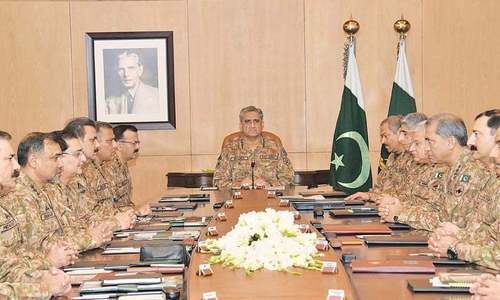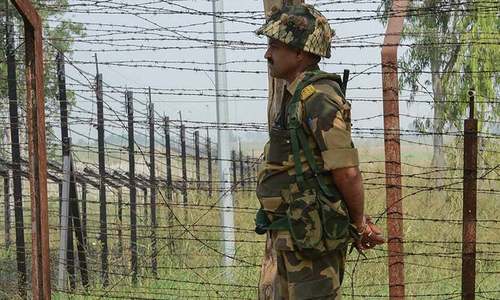ISLAMABAD: After a minister’s hesitation to share the number of Pakistani troops who laid down their lives in recent incidents of Indian firing from across the Line of Control (LoC), Senate Chairman Mian Raza Rabbani on Tuesday held that no information could be withheld from parliament.
Minister of State for Water and Power Abid Sher Ali informed the house that as many as 66 civilians had been killed and 288 injured as a result of unprovoked Indian firing from across the LoC, but the number of army troops martyred could not be disclosed due to security reasons.
“We do not want our enemy to know how many soldiers laid down their lives,” he said.
The minister said a letter had been written to the General Headquarters, seeking more details which were expected to be available in a couple of days.
The chairman said the calling attention notice on the matter had appeared on the agenda on Tuesday but it had been with the Senate secretariat for several days and the information should have come by now.
“Will the order of parliament prevail or that of the Ministry of Defence or GHQ?” he asked.
Stressing that no information could be concealed from parliament, he said if the government wanted, the session could be declared in-camera when it would be shared.
He said parliament was supreme and he could not allow hiding of information from the forum.
The chairman ordered that the information be provided to the house during the current session.
He said that if any matter of national security was involved, there were two options: either an in-camera session could be held or the information submitted to the office of the Senate chairman where the members could go through it.
Senator Ateeq Sheikh of the Muttahida Qaumi Movement had moved the notice to draw the government’s attention towards the loss of precious lives of Pakistani citizens in the Indian firing.
Afghan border
Speaking on an adjournment motion about firing on a census team by Afghan security personnel, Senator Mushahid Hussain Sayed of the PML-Q said Indian Prime Minister Narendra Modi wanted to use Afghan soil to create instability in Pakistan.
He said the United States was pursuing a dual policy on Afghanistan. He recalled that there had been representation of the Haqqani network in a meeting held in Murree where representatives from the United States, China and Afghanistan met the Taliban. He said warlord Gulbadin Hekmatyar had joined the Qaumi Ittehad (national unity) Government in Afghanistan.
“What is the harm in a dialogue with Taliban and the Haqqani network?” he asked.
The senator said Afghan President Ashraf Ghani had talked of opening a Taliban office in Afghanistan. The Afghan Taliban also had an office in Doha where the US had the largest base, but it kept on pressuring Pakistan, he said.
He said the US had met failure in Afghanistan and now it needed a scapegoat with its eyes focused on Pakistan.
He was of the view that Pakistan should appoint a special representative for Afghanistan.
Senator Hafiz Hamdullah of the Jamiat Ulema-i-Islam-Fazl criticised the policy of closing the Chaman and Torkham borders on the plea that they were used by the Afghan National Directorate of Security (NDS) and Indian Research and Analysis Wing (RAW) agents to find their way into Pakistan.
He pointed out that the border with Afghanistan was 2,900km long with many small crossing points and the NDS and RAW people could also use them enter the country. He said the economy of Chaman was linked with the border and its closure was tantamount to punishing the people of the town.
Senator Taj Haider of the PPP said terrorists were a common enemy of Pakistan and Afghanistan and called for joint action against them so that they could not find shelter anywhere. He said economic relations were essential for peace, which could not be achieved by closing the border.
Published in Dawn, June 7th, 2017















































